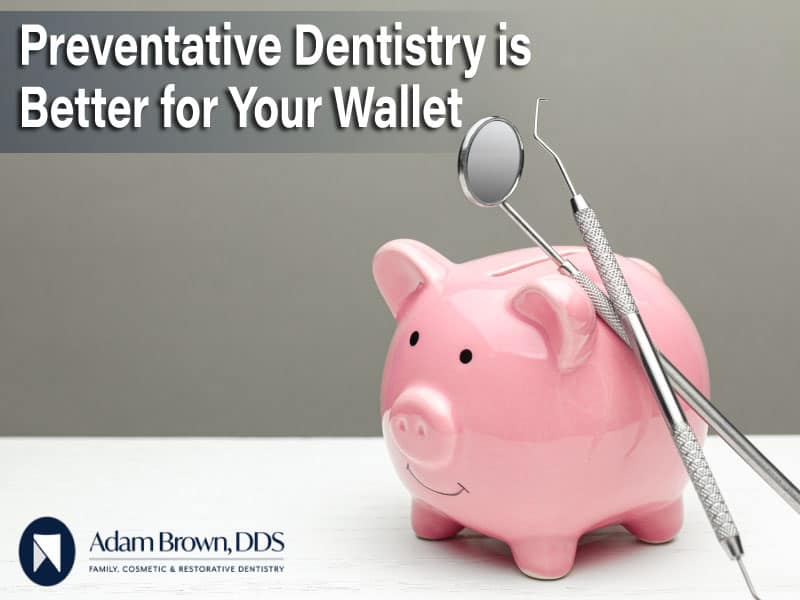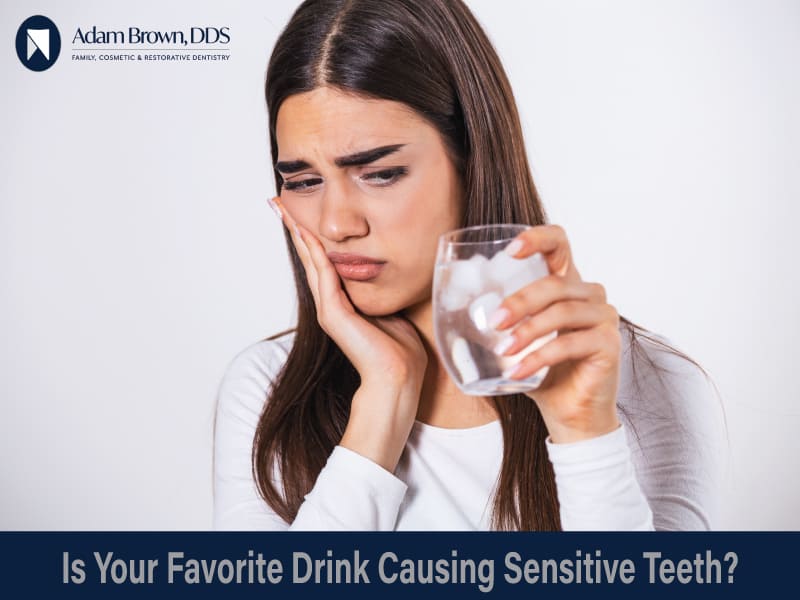Preventative Dentistry is Better for Your Wallet

Scheduling regular dental checkups and cleanings is the best way to maintain positive oral health—it’s also the best way to save money. Monitoring the condition of your teeth and gums can prevent major health issues, as well as, keep you from spending a lot of money on a procedure or surgery that could have been avoided. Tack on the rising costs of dentistry due to inflation and that dental price tag will be even higher.
If you haven’t scheduled your next teeth cleaning/checkup, now is definitely the time.
We all know the importance of brushing our teeth at least twice a day. We also know the necessity of flossing each night—even if we don’t get it done every night, but we try! There is more, however, to maintaining your oral health than the daily routine. A professional checkup is what truly keeps us in the know of our level of oral health and this is how we learn about the specific preventative measures we can take to better our current situation, whatever that might be.
The state of the inside of our mouths is a complicated one: cavities don’t simply show up one day, they turn over time. The same is true with gum diseases and other preventative health issues. These progressively get worse over time if they are not addressed. This is why it’s so important to keep regular checkups so you can always be in the know of where the level of your oral health is.
What is Preventative Dentistry?
Simply put, preventative dentistry is regular, professional cleaning and monitoring of your oral health. Here are a few things that are done and looked for when you come in:
- Removing Hardened Plaque. You know when you visit the dentist and he gets that sharp, silver hook tool and scrapes it against your teeth? Sometimes, he has to press extra hard and poke and prod. What he is doing is removing plaque from your teeth. Though flossing and brushing twice a day can get most of this sticky substance from your teeth, little bits of plaque can still remain and harden. In time, that plaque will discolor and can cause damage to the teeth and gums if it’s not removed. Visiting your dentist twice a year will keep this hardened substance from accumulating.
- Preventing Gum Disease. Bacteria in the mouth can cause gum disease, and most times it is not noticeable to the individual who has it until it’s festered. However, your dentist can help prevent gum disease from ever occurring by professionally cleaning your teeth and gums. And if signs of gum disease continue to show up, he can recommend the proper medication to help illuminate it.
- Preventing Cavities. Plaque and food particles can create cavities, which eat away at the teeth, and like gum disease, cavities can be difficult to notice right away. Unless you see a dentist, that is. If they are found, cavities can be removed and the damaged tooth repaired, or, in extreme cases, the tooth will have to be pulled. Regardless, it is of the utmost importance that cavities are taken care of right away, as they can lead to more serious oral maladies.
- Preventing Oral Cancer. The thought of cancer can be scary, but it’s something that should not be ignored. Instead, it should be prevented. Seeing your dentist twice a year and having an oral exam can greatly help reduce your chances of contracting cancer of the mouth.
Preventative dentistry starts with you—you make and keep the appointments, and you maintain the regime you and your dentist decide upon. At Adam Brown DDS, we like to work in tandem with our patients to first identify any issues or potential issues, then—together—work towards a plan to get that oral health with it needs to be and maintain it.
The Importance of Maintaining Your Oral Health
As stated earlier, preventative dentistry not only preserves your oral health, it also saves you money in the end. Here are a few more key details to preventative dentistry you should consider:
1. You can’t do it alone. It’s tempting to go along with the notion that brushing and flossing your teeth every day is enough to keep that mouth sparkly clean. It is true that brushing and flossing are important procedures, necessary for keeping your mouth clean, but without having regular checks where a dentist can give a thorough assessment of your oral hygiene, there is really no way to tell where your level of health is. Always make time for a dentist to monitor the condition of your teeth and gums.
2. Pay a little upfront to save a ton in the end. Ironically, people tend to skip dental visits in order to save money, however, the price of dealing with a developed condition, that was not caught by your dentist, will end up costing much more money. Imagine paying out of pocket for a tooth extraction—then again for the replacement! The pain and frustration and money just aren’t worth it
3. Visiting your dentist means meeting with a professional who can offer advice on oral hygiene products for purchase that are specific to you and your need(s). There are so many products out there too! Without the guidance of someone who knows what works and what does not, you might feel a bit lost. This toothpaste promises whiter teeth in two weeks, but this one says it fights gum disease—which to get? At Adam Brown, DDS not only can we advise on products to use, but we can also show you how best to use them.
4. With poor oral health come a lot of side effects: bad breath, a crooked smile, browning teeth, chipped or lost teeth…the list goes on, and these side effects can do major damage to an individual’s self-esteem. However, sometimes these issues can be easily dispelled by a quick visit to the dentist. Preventative dentistry has the power to give you back your confidence!
5. The most important aspect of preventative dentistry is that one simple visit could identify life-threatening diseases. Like many areas of the body, your mouth is teeming with bacteria, most of them harmless. Normally the body’s natural defenses and good oral health care, such as daily brushing and flossing, can keep these bacteria under control. However, without proper oral hygiene, bacteria can reach levels that might lead to oral infections, such as tooth decay and gum disease. Certain medications—such as decongestants, antihistamines, painkillers, diuretics, and antidepressants—can reduce saliva flow. Saliva washes away food and neutralizes acids produced by bacteria in the mouth, helping to protect you from microbial invasion or overgrowth that might lead to disease. Studies also suggest that oral bacteria and the inflammation associated with periodontitis, a severe form of gum disease, might play a role in some diseases.
Ultimately, your best option for a healthy, fresh smile is to visit us at Adam Brown, DDS. Let us diagnose the current state of your particular oral health and advise on exactly what can be done to clean those teeth and brighten that smile. No matter your current condition, we can help—be sure to schedule now and save money!

